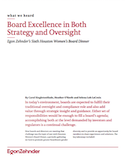Egon Zehnder’s Sixth Houston Women’s Board Dinner
In today’s environment, boards are expected to fulfill their traditional oversight and compliance role and also add value through strategic insight and guidance. Either set of responsibilities would be enough to fill a board’s agenda; accomplishing both at the level demanded by investors and regulators is a continual challenge.
How boards and directors are meeting that challenge was the topic of our sixth Houston Women’s Board Dinner, a periodic gathering we host to promote greater boardroom gender diversity and to provide an opportunity for board members to share experiences and solutions. The key takeaways included:
Strategy doesn’t just happen. While boards may be expected to fulfill compliance and strategy roles, it’s easy for directors to give strategy short shrift in the face of heightened regulatory requirements and investor guidelines. To counter this, CEOs are giving strategy (or some element of it) a permanent place on the agenda. The experience of our dinner guests has been that this is time well-invested; the ability to keep aligned with company strategy is viewed as one of the hallmarks of a solid board—and of a solid CEO.
Directors must take on the leadership pipeline issue. Forward-thinking boards are helping to develop tomorrow’s executive committee members. The boards represented by our attendees have adopted several strategies, including having high-potentials make presentations to the board (either formally during meetings or informally during dinner) and assigning directors to act as mentors and host lunches for rising executives. Many female directors use these initiatives to cultivate female talent. Yet the process is still new; our attendees agreed that there was room for greater involvement.
Board members are publicly supporting their CEOs. One of the primary responsibilities of the CEO is to be the external face of the company. At a time when a company’s constituencies are more vocal and demanding than ever, some board chairs and committee chairs are now publicly representing the company to shareholders. This eases some of the pressure on the chief executive while sending a message of active support for him or her.
New risks prompt a new look at board composition. The emergence of cybersecurity as an ongoing board agenda item highlights a larger problem—how do directors best provide oversight and guidance on highly technical issues? Unless cybersecurity is central to the company business (as it is for a bank, for example), our attendees were disinclined to explicitly add board members with this expertise. Instead, establishing advisory boards of outside experts to advise the board and the executive committee seemed to be the most promising solution. More generally, our attendees held mixed opinions about adding board members with a particular functional or industry expertise if they think they can gain the same insight from an external advisor or consultants.






